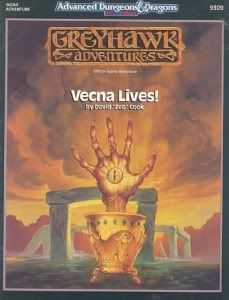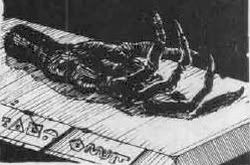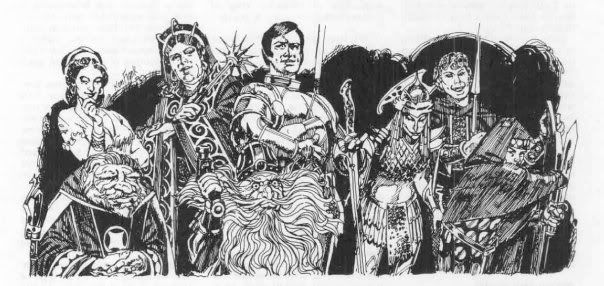 interested in taking old modules and updating the mechanics to be compatible with Pathfinder. And given that I'm such a huge fan of Vecna as a villain, Vecna Lives! was at the top of my list to read. I finished reading it awhile ago, and there were a couple things about it which I felt worth pondering publicly.
interested in taking old modules and updating the mechanics to be compatible with Pathfinder. And given that I'm such a huge fan of Vecna as a villain, Vecna Lives! was at the top of my list to read. I finished reading it awhile ago, and there were a couple things about it which I felt worth pondering publicly. The one thing which is giving me the most trouble is instant and unavoidable death. I've always known that this was something which showed up in Gygaxian D&D, but I've never seriously thought about including it in a game before. I always looked on death without a saving throw as an outdated idea, one which had a kind of oldschool, hardcore charm, but not one I'd want to subject my players to. After all, I was bred on D&D 3.5, where it is a well known unwritten rule that no matter what players must always be given a chance to survive, even if that chance is just a roll of the dice.
However, if I want to update Vecna Lives! for Pathfinder, then I'm faced with a choice. Either I can include the few examples of "instant death, no saving throw" which show up in the module, or I can deviate from my attempt to be faithful to the original experience of the game. On the face of things, the rule that players must always have a chance to survive seems like a very good rule; nobody likes a game which makes them feel as though they were not given a fair chance to win. However, a saving throw is rarely the only time a player is given the opportunity to avoid a particular fate. It is the last opportunity. Actually, opportunity is somewhat of a misnomer, a character whose life rides on the success or failure of a saving throw is Schrödinger's PC. As the die rolls the character is in a state of being both alive and dead at the same time, and if the die lands on 1, then we open the box and learn that the PC was dead the whole time. And when that happens, is it really any different from a GM simply declaring that the PC has died?
Of course, quantum physics aside, a die roll is still a chance to survive, and players are right to feel they deserve a chance to survive. But as I mentioned above, the saving throw is often the last chance to survive, not the only chance. If the party encounters a statue of a dragon with a gem clenched in its marble teeth, and an ancient language swearing death to any who would disturb the monument is scrawled around the base; then perhaps the rogue who snatches the gem before the wizard finishes deciphering the warnings deserves to die. Even if nobody could read the script, the rogue could have at least used a stick to try and knock the gem out of the dragon's maw. Not only does the rogue have the opportunity to avoid death, but some adventuring sense offers much better odds than a saving throw.
Though if your GM puts such a gem in a pile of random treasure at the end of a dungeon, and whoever gets it in their share of the loot is declared dead, then your GM is a dick.
Furthermore, denying saving throws is not an all or nothing deal. In Vecna Lives! instant death effects appear twice if I recall correctly. The first is during the opening scene, where the players take control of powerful characters which have the sole purpose of being killed by the GM within minutes, just to show that this module means business. Later, if the PC's choose to attack Vecna himself during a moment of distraction on his part, the evil god snuffs them out of existence with a thought. The former is a very special and uncommon circumstance, and the latter seems to me like a justified punishment for impossible stupidity. Attacking a god is not something a non-epic character is going to get away with.I see no need to make it more complicated than "um...you're dead."
Aside from these two specific instances,
 there is a potential third opportunity for the players to face (or wield!) instant death. Much of the adventure revolves around the classic D&D artifacts, the Hand and Eye of Vecna. According to the information on these artifacts at the back of the book, anyone touched by the full palm of the Hand of Vecna is killed with no saving throw. Which means that if you're fighting someone who has the hand of Vecna, you're one successful touch attack away from death. Now, the module never puts the player characters in a position where they will face an opponent who wields this deadly artifact, but I'm uncomfortable even having it exist in the game.
there is a potential third opportunity for the players to face (or wield!) instant death. Much of the adventure revolves around the classic D&D artifacts, the Hand and Eye of Vecna. According to the information on these artifacts at the back of the book, anyone touched by the full palm of the Hand of Vecna is killed with no saving throw. Which means that if you're fighting someone who has the hand of Vecna, you're one successful touch attack away from death. Now, the module never puts the player characters in a position where they will face an opponent who wields this deadly artifact, but I'm uncomfortable even having it exist in the game.The question, though, is how to make it fair without neutering it. It is, after all, the severed hand of a deity. It should have a fearsome and terrible power for the players to tremble before. So how about this:
Someone with the Hand of Vecna can instantly kill anyone with 10HD or less on a successful touch attack (no saving throw). Creatures with more than 10HD are entitled to a fortitude save DC 20. On a failed save, the character dies. On a successful save, the character is reduced to 1 hit point and knocked prone. If the character with the hand also possesses the eye of Vecna, the DC to resist is raised to 25. (Saving throws based on D&D 3.5 Dungeon Master's Guide)
Using this rule, players will feel almost exactly the same way about the hand: they'll want to avoid it at all costs. But even if they can't avoid it, or don't even know that their enemy has it, then they at least have a chance at achieving a near-death experience, as opposed to dying outright.
Moving on, Vecna Lives! is also the first module I've read which has such a strong focus on mystery, detective work, and role playing. A lot of adventures include some of that, but this is a ninety five page module which downplays combat encounters, and has no dungeon crawls. The adventure goes from the players trying to learn who the bad guys are, to trying to find out where the bad guys are, to trying to figure out how to stop the bad guys. And [spoiler alert] even the final solution is essentially a matter of role playing, with the PCs summoning The Old One to duke it out with Vecna, evil god to evil god.
Games like that have always been my weakness as a GM. I love to plan them, but they never quite work out the way I hope they will. It often feels as though I'm stuck nudging the players along, giving them every hint until it feels like their presence at the table is redundant because I'm playing my own adventure. Granted, my group has admitted in the past that they don't think they're very good at looking for clues, but I still feel like they might have an easier time if I took lessons from Vecna Lives!
First off, there should be a variety of ways to reach any of the conclusions necessary to move forward in the storyline. In my games I've done things such as sending the characters catch some smugglers red handed, hoping that they would take the time to interrogate one of the smugglers. This would allow them to learn the name of the smuggler's contact within the city's criminal element, and thus allow the players to come closer to finding the den of the crime boss. The problem is that my players would never think to question the smuggler, leaving me to wonder how to move the game forward without stealing their sense of accomplishment.
Vecna Lives! readily admits that players may be dense sometimes. In fact it frequently uses language like "if they still don't get that they need to do X, you may need to slap them upside the head," or my personal favorite "you may need to give up on them." However, despite the auspicious author's candid comments about players who aren't able to detect well, he also provided many paths of investigations for the characters to follow to reach the same goal. You might say that while the example of my game which I gave above constructs detective work as a linear exercise, Vecna Lives! provides GMs with an entire web of interconnected information for the PCs to discover.
For example, in trying to determine what happened to their predecessors (the powerful characters killed by the GM which I mentioned earlier), the players have the options of inquiring with the victim's colleagues and friends, or of looking into what books those characters checked out of the city's libraries before they departed on their ill fated journey. Talking to some friends might lead to other friends, and those friends might lead to specific libraries which can be investigated, and a book found there might lead the PCs to consult an expert on the book's subject matter to learn even more.
I've already got outlines for the next few games I'll be running with all of my groups, but I'm already excited to give mystery based sessions another attempt.

As a final word, I'd like to give a nod to a nice role-playing helper the module provides.
The bulk of the adventure is meant to be played by 8 pre-generated characters detailed in the back of the book. The characters are a rag-tag group, banded together by their relationship to the more powerful characters killed off in the first few minutes of the adventure. Each character's description is understandably short, but I was very pleased that they allocated the space in each of the 8 character descriptions to write seven paragraphs about that character's relationships with the other seven PCs. Reading over those descriptions gave me a sense of how the characters will work as a group. And I noticed that more than a few characters had a relationship which could provide interesting role playing opportunities. Such as the half-elf who thought the paladin was standoffish, while the paladin was only distant because the half elf reminded him of his own son. A player playing the Half Elf might easily choose to forsake the highroad and lash out at the paladin, only to have the paladin's player choose to break down crying. As a GM who often thinks about ways to better encourage my players to role play, I found this both simple, and potentially effective.
I don't know when I'll get around to updating this 95 page monster to Pathfinder, but I'll be sure to post it when I do. Don't be surprised if years pass.
This was one of the first modules I ever bought, back in the 90s. I never ran it because, back then, I rarely ran modules (it felt sort of like cheating). I don't feel that way anymore though, and I just recently reacquired a copy of it. I'm thinking it might be fun to do as a "miniseries" type of campaign, in all of it's Second Edition glory (even though it's not my favorite edition, it is the edition that I started with).
ReplyDeleteThanks for commenting! I always like to see that these older posts are still being enjoyed.
ReplyDeleteThink you'll be able to get all 8 players for the module? I'd be very interested in knowing how your games would go if you do end up running Vecna Lives.